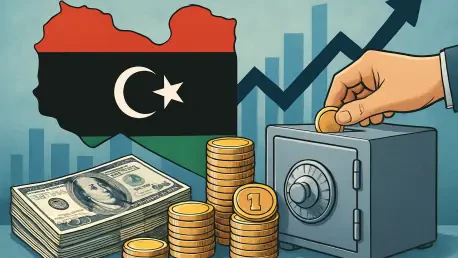In a nation long plagued by political turmoil and economic instability, Libya stands at a critical juncture as it endeavors to rebuild and fortify its financial infrastructure, taking significant steps under the leadership of the Central Bank of Libya (CBL) and Governor Naji Issa to modernize the banking sector. These reforms, aimed at enhancing transparency and aligning with global standards, are not merely bureaucratic adjustments but a lifeline for a country seeking to restore public trust and attract international confidence. From reopening foreign currency markets to private firms to combating financial crimes through stringent regulations, the efforts span multiple dimensions of the financial ecosystem. As Libya navigates these complex challenges, the balance between regulatory enforcement and operational freedom remains delicate, raising questions about the sustainability of progress. This exploration delves into the key initiatives driving change and the hurdles that must be overcome to achieve lasting stability.
Modernizing Banking and Currency Operations
The Central Bank of Libya is spearheading a transformative agenda to revitalize the financial sector by focusing on accessibility and efficiency in currency transactions. A pivotal move involves granting final approvals to private firms for resuming foreign currency exchange operations, a process that includes reviewing over 2,000 new applications from interested companies. To facilitate this shift, the CBL is rolling out a new electronic system designed to streamline processes and enhance transparency. Training programs for approved entities are also being implemented to ensure compliance and operational readiness. These measures reflect a broader commitment to rebuilding trust in the financial system, which has been undermined by years of conflict and mismanagement. By opening up currency markets to private players, the CBL aims to stimulate economic activity and provide a more robust framework for international trade, which is vital for Libya’s recovery and integration into the global economy.
Beyond currency operations, digital transformation is at the heart of Libya’s banking reforms, with a clear focus on improving cash liquidity and modern payment solutions. Governor Issa has been engaging with commercial bank executives to strategize on currency withdrawal mechanisms and bolster electronic payment systems across the country. The push for digitization is not just about keeping pace with global trends but also about addressing practical challenges, such as ensuring citizens have reliable access to funds. Enhanced electronic systems are expected to reduce dependency on cash transactions, which often fuel illicit activities, and instead foster a more secure and traceable financial environment. Public confidence, severely eroded by past crises, stands to gain from these initiatives as they promise greater convenience and accountability. However, the success of this digital shift hinges on infrastructure development and widespread adoption, both of which require sustained investment and public awareness campaigns.
Strengthening Regulatory Compliance and Global Standards
A critical pillar of Libya’s financial overhaul lies in its pursuit of international compliance, particularly in the fight against money laundering and terrorism financing. The National Committee for Combating Money Laundering and Terrorism Financing is pressing authorities to fast-track a new anti-money laundering and counter-terrorism financing (AML/CFT) law that aligns with the standards set by the Financial Action Task Force (FATF). Delays in enacting this legislation pose a significant risk to Libya’s global financial reputation, potentially branding it as a high-risk jurisdiction. Such a label could have dire consequences for economic stability and food security, as international partners may hesitate to engage in trade or investment. The committee is diligently assessing financial risks and crafting strategies to shield the economy, underscoring that these reforms are not optional but a national imperative for safeguarding Libya’s future on the world stage.
At the local level, regulatory enforcement is being tightened to ensure businesses adhere to financial and operational standards, as evidenced by actions in Benghazi. The Municipal Guard has issued stern warnings to business owners, mandating compliance with city regulations, including possession of valid commercial licenses, payment of taxes, and settlement of utility fees. Non-compliance risks severe penalties or even closure, signaling a no-tolerance approach to regulatory lapses. This localized crackdown mirrors a nationwide trend of heightened oversight across various sectors, aimed at creating a culture of accountability. While these measures are designed to foster order and fiscal responsibility, they also highlight the challenges faced by small businesses struggling to meet stringent requirements amid economic hardship. Striking a balance between enforcement and support for local enterprises remains a pressing concern for authorities as they push forward with broader financial reforms.
Navigating Challenges and Humanitarian Impacts
One of the more contentious aspects of Libya’s financial reforms is the unintended consequences of stringent monitoring, exemplified by the freezing of nearly 964,000 dinars belonging to the Barara Charity Association. These funds, earmarked for humanitarian aid in Gaza, were halted due to a report of suspicious transactions, effectively stalling the charity’s operations. This incident raises critical questions about the calibration of financial oversight mechanisms and their impact on legitimate humanitarian efforts. While the intent behind such freezes is to prevent misuse of funds, the disruption caused to aid initiatives underscores potential flaws in the system. Authorities must address these gaps to ensure that security measures do not disproportionately harm organizations dedicated to social good, especially in a country where humanitarian needs are acute due to ongoing instability.
Looking back, the journey of Libya’s financial reforms reveals a landscape of both promise and peril, with each step forward accompanied by complex challenges. The freezing of charitable funds and the risk of international sanctions due to legislative delays serve as stark reminders of the delicate balance required in regulatory enforcement. Yet, the strides made by the Central Bank of Libya in reopening currency markets and advancing digital banking lay a foundation for economic resilience. As the nation moves through these reforms, the focus shifts to actionable solutions, such as refining monitoring systems to protect humanitarian efforts and accelerating legislative processes to meet global standards. Future considerations include fostering dialogue between regulators and businesses to mitigate operational disruptions, ensuring that the path to stability is inclusive and sustainable for all stakeholders in Libya’s evolving financial ecosystem.









